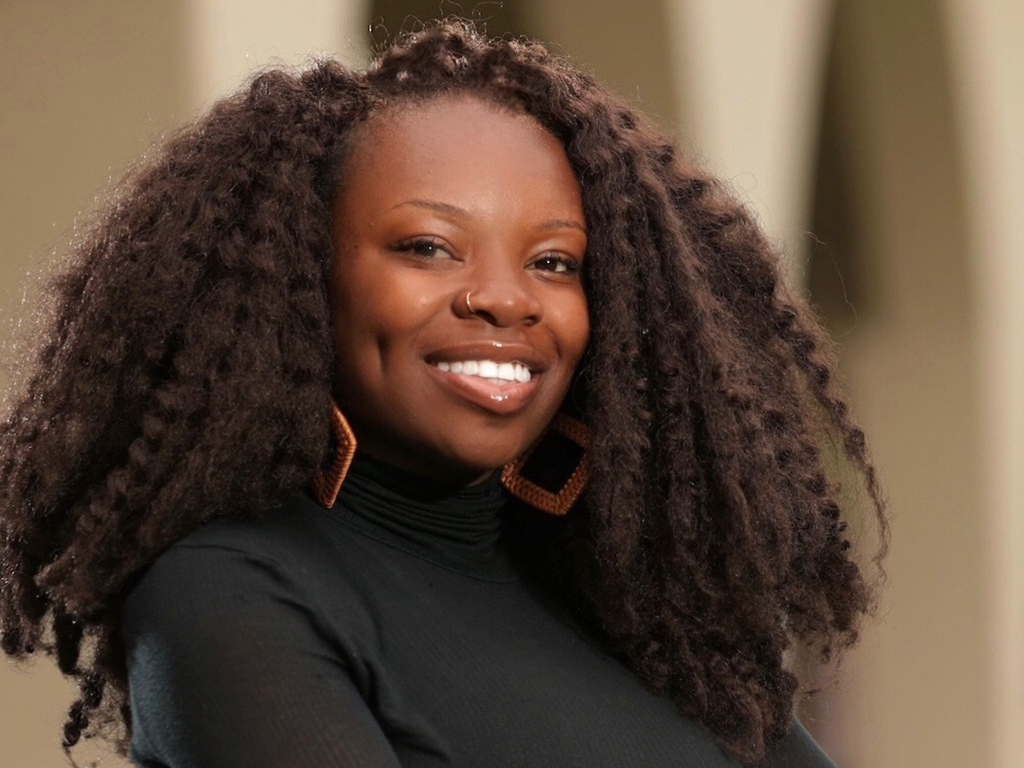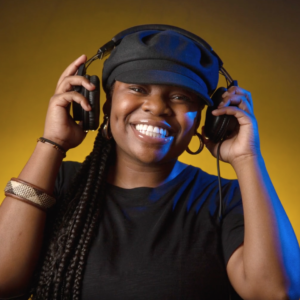
INITIATIVE AFFILIATION
- Fellow (2021-2023)
- Fellowship location: NYU and Stanford University
- Member, Peer Mentor Network
EXCELLENCE, AT-A-GLANCE
PhD program: UC San Diego, Economics
BA in Economics (Minor in Anthropology), University of California, Riverside (2021)
Valedictorian, AEA Summer Program, Advanced Track (2020)
Research: “Despots & Development: A Critical Socioeconomic Analysis of Africa’s Leaders for Life”
Meet Precious Fasakin
Precious joined the Initiative (at NYU Stern) in July 2021, after graduating from the University of California, Riverside, with a BA in Economics and a minor in Anthropology.
While an undergraduate, Precious received a Chancellor’s Research Fellowship, was an RA with the National Science Foundation’s Research Experiences for Undergraduates (REU) program and with the Blum Initiative on Global & Regional Poverty, and sat on the editorial board of the University of California Riverside Undergraduate Research Journal. In 2020, she was named Valedictorian of the AEA Summer Program‘s Advanced Track.
LISTENING AND LIFTING UP
Precious spent several years as a DJ, journalist, and student manager within her campus radio station, KUCR 88.3 FM, where she hosted a weekly program highlighting the music, culture, and history of the African continent and its diaspora, broadcast to more than 50,000 unique listeners.
During her senior year she also served as co-president of the Underground Scholars Initiative, an organization helping to build a pipeline to higher education for individuals impacted by incarceration, and she has spent more than five years as lead journalist and head intern with the nonprofit organization Global Girl Media.
…
for more FROM precious…

>> Follow her on Twitter @bukifasa
>> Listen to playlists from her radio broadcasts with KUCR
Entrance Interview: Economics in Her Own Words
I believe I first began to recognize and appreciate the power of economics once I was able to define it for myself. In my final year of high school, I was struggling with AP Economics and had become disillusioned. My mentor at the time encouraged me to channel my curiosity and my frustration into empowerment and investment in the world around me. She suggested I read Collective Courage: A History of African American Cooperative Economic Thought & Practice, by Jessica Gordon Nembhard.
That book altered my perception of economics and made clear its potential for justice and equity. Understanding that economics is about resources and their allocation, and not necessarily money itself, was the moment I began to see it all around me: in co-ops, credit unions, and farmer’s markets—even in the ingredients of my mother’s stew! I began to see the study of economics as an opportunity to respond critically to marginality, crisis, and inequity.
I also see my economic research as a way to honor the story of sacrifice and intergenerational wealth accumulation, especially in human capital, within my family—for example, the way my maternal grandfather promised and sold cocoa not yet harvested to support my mother’s school fees. His and other family members’ values and resourcefulness created generations of increased opportunity.
The experiences of my family in the United States and in Nigeria inspire me to ask important societal and structural questions. Ultimately, my research interests lie in the belief that expanding human capabilities, examining and critiquing the role of institutions in economic growth, and adopting a community-centered approach to development are foundational elements of economic stability and longevity.”
…
Precious’s research explores the relationship between freedom and development, particularly in Sub-Saharan Africa, and focuses on community-based economic models for asset-building, empowerment, and equity in the Global South. Hoping to work at the intersection of economic development, political economy, cooperative economics, and emerging markets with an African regional focus, Precious plans to use her time in the Ph.D. Excellence Initiative to gain further skills, insights, and mentorship that will enable her to successfully pursue a doctoral degree and serve as an educator, economist, and journalist in years to come.
Extra Credit with Precious Fasakin
Non-commercial and community-based media and music! I have spent time in journalism, filmmaking, and radio broadcasting and DJ-ing since I was 15. I love to tell stories through music and visuals. Over the past four years, my weekly radio show at KUCR highlighted the culture, history, and music of the African continent and diaspora, through musical history and interviews with researchers and community leaders in places such as Brazil, Nigeria, Ethiopia, Mali, and Haiti. These conversations have informed and motivated me in profound ways, impossible to fully articulate.
Two economists serve as continual sources of inspiration for me: Dr. Belinda Archibong and Dr. Jessica Gordon Nembhard. Their approach to economics reminds me that within this field, the communities we work alongside can and must always come first, and the best research is we-search.
The ever-expansive possibilities of collective action and solidarity.
Upside Down: A Primer for the Looking-Glass World, by Eduardo Galeano
Collected Fictions, by Jorge Luis Borges
Ògbójú Ọdẹ Nínú Igbó Irúnmọlẹ̀, by D. O. Fagunwa (English: Forest of a Thousand Daemons, Trans. Wole Soyinka)
Narrative of the Life of Frederick Douglass: an American Slave, by Frederick Douglass
I would recommend the radio program “Letters and Politics” with Mitch Jeserich on KPFK during your weekday drive or walk. The journalism and conversations made possible through this program have been a source of insight for me for years!
I would also recommend personal archiving: digitize and print photos; listen to, record, and write down stories from the elders of your household and community (with dates, locations etc.), and always keep an original backup copy! I love the process of archiving for my own family and friends. It has brought me so much closer to my extended family and makes every gathering feel long lasting.
Genuine curiosity, sincerity, compassion, resolve, and a life-long commitment to learning and serving.
I would love to spend time in Cabo Verde, a group of islands off the West African coast. One of my favorite artists, Cesaria Evora, highlighted the islands’ style of blues (morna), and I would love to hear its melancholic grooves straight from the source itself.
Most mornings, I wake up while the world is still quiet (between 4:00 and 5:00 AM) and get started on my work. By the time I get a good amount done the sun is rising, and I treat myself with some lemongrass or green tea. I can relax knowing that I have handled the majority of my responsibilities and have more hours in my day for personal pleasures, research, and time with my loved ones.
The radio! Radio is such a unique and open form of communication, and it remains the most accessible and affordable form of media available. In the Global South, it is often the only mass medium available. Working as a DJ and journalist with radio stations in the U.S. and abroad, I have come to appreciate it more and more. I spend a lot of my free time listening to original radio programs and music shows, preferably commercial-free!